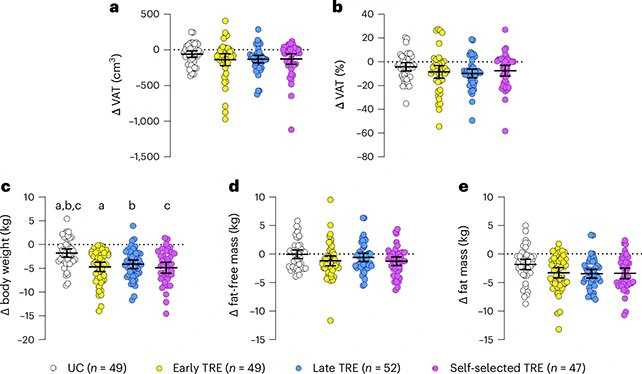
View pictures in App save up to 80% data.
Evidence for the positive effects of intermittent fasting continues to mount: a new study shows that for people with obesity, it can lead to additional weight loss, as well as improved regulation for some of the body's key processes.
The research team, from institutions across Spain, wanted to build on previous studies of intermittent fasting – which includes time-restricted eating (TRE) – by looking at different schedules for eating and different types of fat loss.
"TRE appears to be a safe, well-tolerated, and feasible dietary approach for adults with overweight or obesity," write the researchers in their published paper.
The study involved 197 participants with overweight or obesity, aged between 30 and 60, followed over the course of 12 weeks. All the volunteers were put on the Mediterranean diet and given advice on nutrition.

View pictures in App save up to 80% data.
Four distinct sub-groups were formed: one group limited their eating to an eight-hour window in the morning and afternoon, another confined their eating to an eight-hour span in the afternoon and evening, a third group was allowed to eat during any eight-hour period of their choosing, and the final group had no specific eating limitations other than adhering to the Mediterranean diet.
The findings indicated that intermittent fasting resulted in an average weight loss of 2.4 to 3.1 kg (5.3 to 6.8 pounds) compared to the control group, which did not adhere to any time-restricted eating (TRE) guidelines. The various time windows implemented in the TRE groups exhibited minimal differences in outcomes.
Magnetic resonance imaging (MRI) scans showed no differences across the groups in the reduction of the visceral adipose tissue (VAT) – fat surrounding our organs, that's strongly associated with cardiometabolic health.
Nonetheless, the TRE group that followed the early schedule exhibited a greater decrease in subcutaneous adipose tissue (SAT), which is the type of fat that is more noticeable just beneath the skin.
Furthermore, information gathered from glucose monitors indicated positive outcomes for the early TRE group: their glucose levels were more effectively controlled during fasting periods and throughout the night, suggesting that their bodies were handling glucose in a more optimal manner.
The researchers think that stopping eating earlier in the day could give the body more time to properly process food and nutrients. It's another tick in the positives column for time-restricted eating as part of treatment for adults with overweight and obesity.
In Spain, where the study was conducted, more than half of all adults are classed as overweight or obese. It's also a country where eating happens all across the day – sometimes from a 7–8 am breakfast to as late as a 10 pm evening supper.
For many people, TRE offers an effective way of limiting energy intake in a way that's easy to stick to. However, there are still questions over how exactly it affects the body and what negative side effects could occur, so this study adds some useful detail to what we already know.
"Current literature suggests that TRE is well tolerated, has high adherence rates with minimal side effects and results in modest reductions in body weight and slight improvements in cardiometabolic health in individuals with overweight or obesity," write the researchers.
The research has been published in Nature Medicine.










